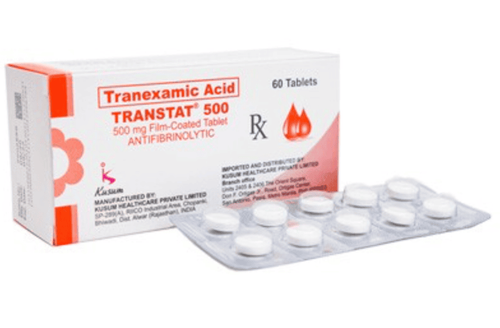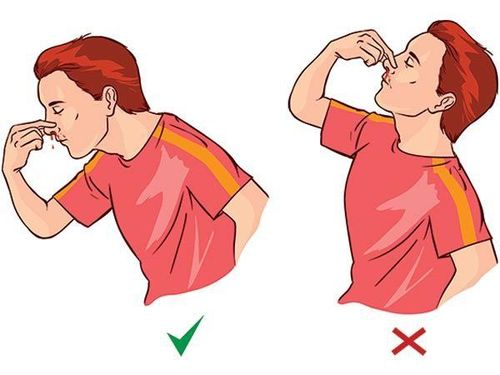This is an automatically translated article.
The article is professionally consulted by Master, Doctor Vu Huu Thang - Emergency Resuscitation Doctor - Emergency Resuscitation Department - Vinmec Ha Long International HospitalNosebleeds many times a day, lasting for many days is one of the signs that a patient should visit a doctor for intensive care and urgent treatment.
1. Is nosebleed dangerous?
The inner cavity of the nose contains many small blood vessels. Usually, if this area is dry or irritated by external factors, it will lead to a nosebleed, also known as a nosebleed. Symptoms of a nosebleed include blood coming from one or both sides of the nose, which can also run down the back of the throat, leading to coughing, coughing, or bloody vomiting. After losing a large amount of blood from the nose, when passing stools, the patient may observe black or tarry stools, this means that the patient has swallowed a large amount of blood through the gastrointestinal tract. chemical.
Children are often subject to nosebleeds. The most common causes of nosebleeds in children are allergies, colds, sinus infections, decreased moisture in the nose (from breathing in dry air, especially in winter) and other skin irritations. other preferences (eg, child picking nose vigorously, foreign object entering nose, trauma, nose bump). Sometimes, the cause of nosebleeds can be due to abnormalities in the structure of the nose and the abnormal growth of the nose from birth.
There are many factors that increase the risk of nosebleeds, including: hot and dry indoor climate, exposure to chemicals or irritants, certain medical conditions, heavy alcohol use, effects of medications and supplementary food. Nosebleeds are common, often self-limiting and rarely have serious consequences.

2. Signs of nosebleed need to see a doctor
2.1. In adults Adults with nosebleeds need special medical attention if they notice the following signs:Have an injury or have had a serious accident, such as a car accident; Blood appears more than usual nosebleeds; Affects ability to breathe; The condition lasts more than 20 minutes, even when the airway is blocked to prevent bleeding. If the patient loses too much blood, as in the case of nosebleeds many times a day or nosebleeds continuously for many days, do not drive yourself to the hospital. Instead, ask a friend or family member to take you, or call the emergency number of a medical facility for assistance.
Symptoms of nosebleeds many times a day can cause patients to lose a lot of blood in a short time. Therefore, even if the patient feels that the blood loss is not very serious, the patient still needs urgent care. In addition, the doctor needs to know the frequency of nosebleeds during the day and how many days to find the cause and make an accurate diagnosis.
2.2. In young children For small children, parents need to pay close attention because the child may not fully express it outwardly. In some of the following situations, a child needs urgent care for a nosebleed:
Heavy bleeding, feeling dizzy, weak; Caused by a fall, bump or injury; Bleeding that doesn't stop, even when the airway is blocked twice, for 10 minutes each time to stop the bleeding. Parents should take their child to a doctor if they notice:
The child has frequent nosebleeds, many times a day or continuously for many days; Caused by the child accidentally stuffing something in the nose; The child bleeds heavily despite the minor injury; Bleeding that also originates from other areas of the body, such as the gums; Signs of bruising due to minor trauma; Suspected effect of a certain drug recently used for children.
3. Who often suffers from severe nosebleeds?

If nosebleeds only happen occasionally, there is nothing to worry about. However, if it is caused by a new medication, due to a specific medical condition or medical condition, nosebleeds can become more severe, last for several days, and require medical attention. special support.
Patients who are taking active blood thinners such as warfarin (brand names Coumadin, Jantoven) or aspirin may make bleeding worse than usual. Sometimes, treatment with one of these drugs will lead to nosebleeds that won't stop on their own. Some patients with coagulopathy may also experience frequent nosebleeds due to the improper functioning of the clotting mechanism. To manage this situation, the doctor will have to put a special bag in the patient's nose to stop the bleeding.
In any case, if you have nosebleeds many times a day, continuously for many days, difficult to stop bleeding or accompanied by bleeding gums, bleeding due to small cuts, the patient should go to the hospital to see a doctor. as soon as possible.
Please dial HOTLINE for more information or register for an appointment HERE. Download MyVinmec app to make appointments faster and to manage your bookings easily.
Reference source: Webmd.com; Mayoclinic.org













